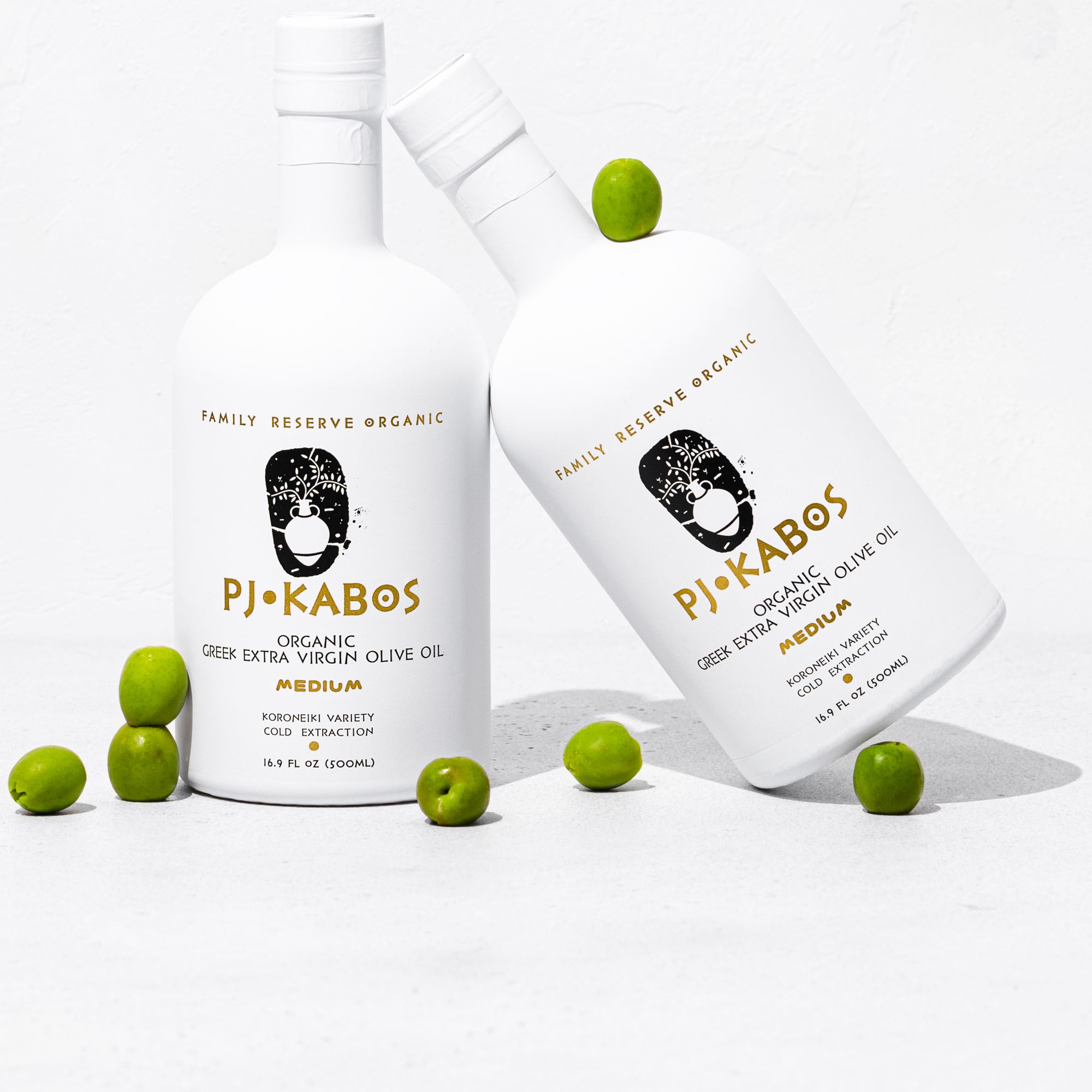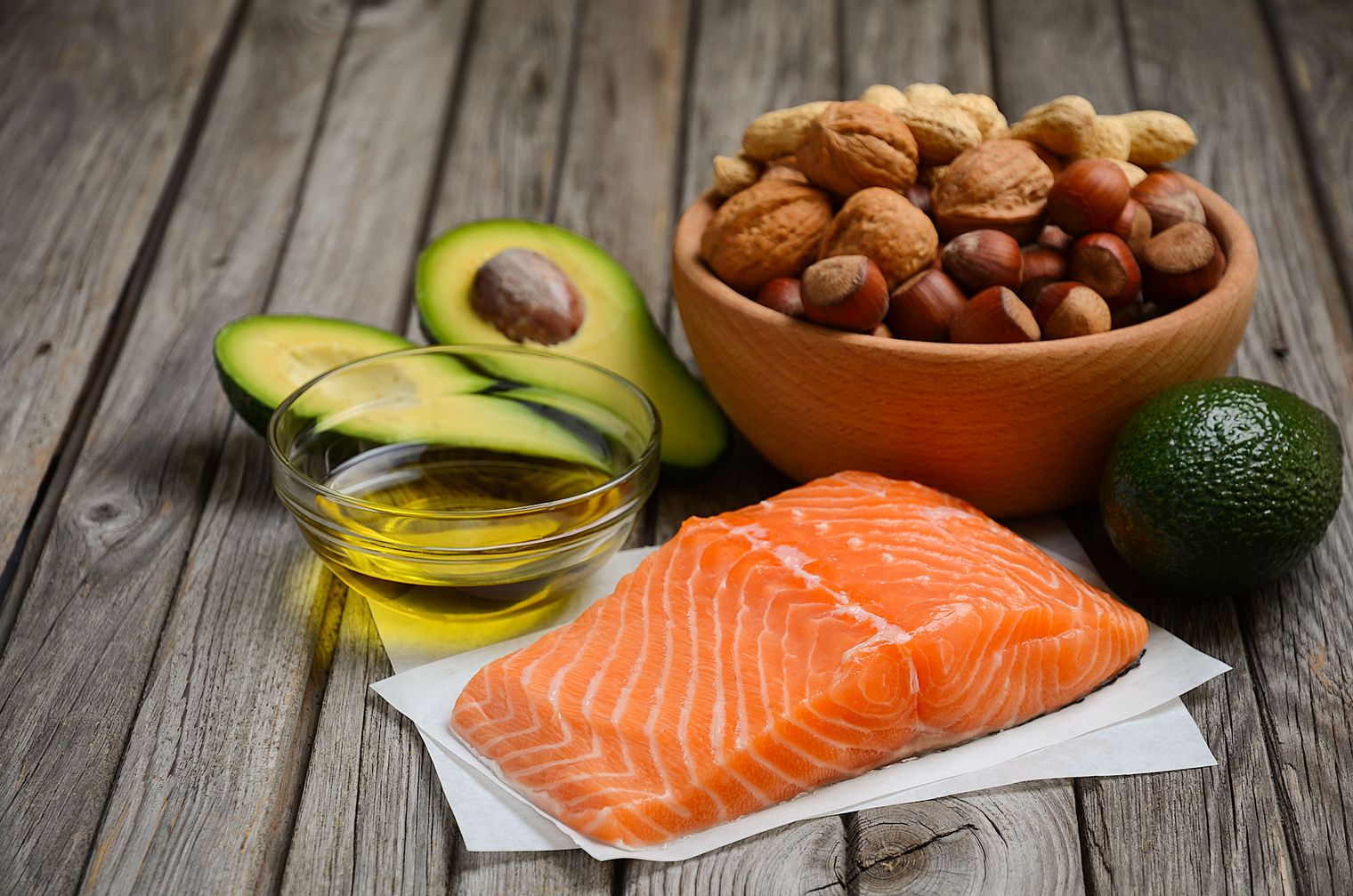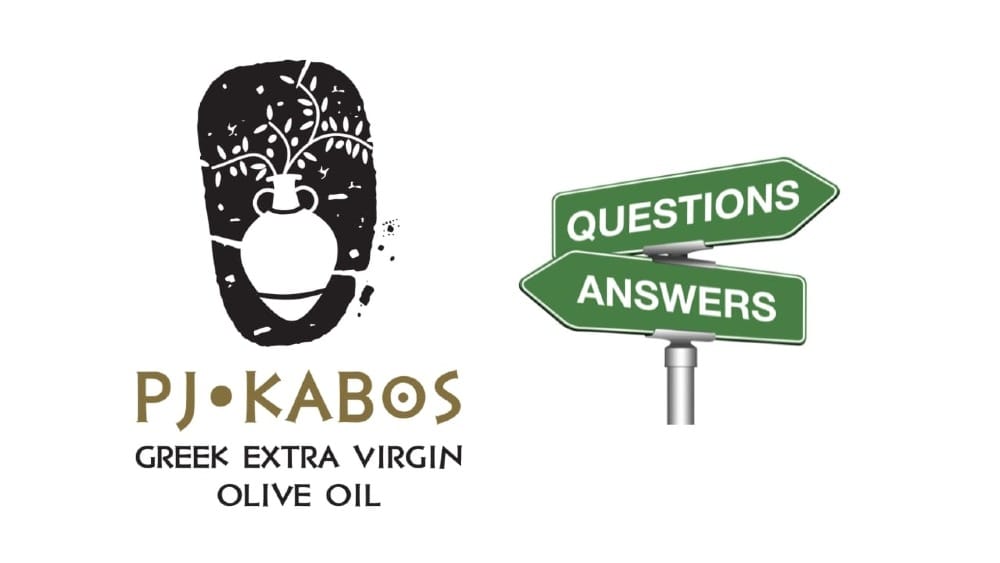What Are Monounsaturated Fats?
Fat is essential for proper brain and neural development, absorption of vitamins and antioxidants, hormone production, and so much more. But it’s true that certain types of fat are healthier than others. Enter: Monounsaturated fat (MUFAs). This is the predominant type of fat found in olive oil, and most nutrition experts consider it to be one of the best!
To get a little technical, the term monounsaturated refers to fat molecules that have one double bond in their carbon chain (meaning, they have one unsaturated carbon bond), while polyunsaturated fats contain more than one double bond and saturated fats contain all single bonds. Like all unsaturated fats, MUFAs are liquid at room temp and only solidify once chilled.
The category of monounsaturated fats encompass several specific fatty acids: Oleic acid is the most abundant MUFA in the diet and it represents about 55-83% of olive oil’s total fatty acid composition. Other MUFAs include palmitoleic acid and vaccenic acid.
Monounsaturated fats are found in nutrient-rich plant foods such as nuts, seeds, avocados, olives, and olive oil, and they’re associated with a range of health benefits such as optimized cholesterol levels, reduced inflammation, reduced risk of heart disease, and more.
6 Health Benefits Of Monounsaturated Fats
Monounsaturated fats are widely considered heart-healthy and anti-inflammatory. But their perks go way beyond that. Here are 6 full-body benefits of MUFAs, based on recent research:
1. MUFAs are anti-inflammatory
Research suggests that a saturated fat-rich diet contributes to chronic inflammation and increases risk for a variety of metabolic disorders such as cardiovascular disease, type 2 diabetes, and fatty liver. A MUFA-rich Mediterranean diet, on the other hand, activates mechanisms that reduce inflammation and your risk of developing metabolic syndrome—a cluster of conditions that increase your risk of heart disease, stroke, and diabetes.
Other studies have found that MUFA-rich diets reduce levels of C-reactive protein—a marker of chronic inflammation.
2. MUFAs stabilize blood sugar + help prevent diabetes.
Research shows that the MUFA oleic acid has protective effects against insulin resistance, which is a main driver of type 2 diabetes. Further research shows that swapping out saturated fats in favor of MUFAs activates anti-inflammatory mechanisms that can reverse some of the harmful effects saturated fats have on insulin-producing beta cells of the pancreas. Additionally, fat slows the absorption of glucose into the bloodstream, which helps keep blood sugar stable.
3. MUFAs help lower bad cholesterol + raise good cholesterol
Consuming foods rich in monounsaturated fats may help optimize cholesterol levels. Research has shown that MUFA-rich diets reduce total cholesterol and LDL cholesterol (“bad” cholesterol) and increase HDL cholesterol (“good” cholesterol). There are a few mechanisms by which they may do this. For example, unsaturated fats like MUFAs increase the number of LDL receptors on the liver—and when there are more LDL receptors, they pick up more LDL from the blood, thereby lowering LDL cholesterol levels.
4. MUFAs may reduce risk of heart disease + stroke.
Large epidemiological studies suggest that replacing saturated fats in the diet with monounsaturated fats, particularly oleic acid, is associated with reduced risk of coronary heart disease—as long as total daily calories aren’t increased. But why? Researchers believe that oleic acid modifies lipoprotein and cholesterol concentrations in the blood, reduces blood coagulation, improves glucose homeostasis (the ability to maintain blood sugar levels within a healthy range), and reduces inflammation and oxidative stress.
Because of MUFAs beneficial effect on cholesterol, they may also reduce risk of ischemic stroke, which occurs when vessels carrying blood to your brain get blocked by deposits of fat, cholesterol, and other debris in the blood.
5. MUFAs may curb risk of certain cancers.
Inflammation is a driver of all forms of cancer, which makes monounsaturated fats a great addition to your diet if you’re looking to curb risk. Additionally, several studies have shown that the MUFA oleic acid may actually help suppress the activation of certain genes associated with breast cancer and brain cancers.
6. MUFAs optimize your nutrient intake.
Monounsaturated fats don’t contain other nutrients, but they are often found in foods that are moderate to high in vitamin E—an antioxidant vitamin that helps protect cells from damage caused by free radicals and promotes blood, brain, and skin health. Like all fats, monounsaturated fats also help the body absorb fat-soluble vitamins (A, D, E, and K) and antioxidant compounds like beta-carotene and lycopene from plant foods.
What To Eat To Get More MUFAs.
Monounsaturated fats can be found in all sorts of foods, but these are particularly potent sources:
Culinary Oils
- Olive oil, avocado oil, almond oil, hazelnut oil, canola oil, high-oleic sunflower oil, and high-oleic safflower oil are the cooking oils with the highest levels of MUFAs. Pro tip: Olive oil and avocado oil are available in minimally processed forms and often considered the healthiest.
- MUFA-rich cooking oils are also a decent source of vitamin E, according to the American Heart Association.
- To optimize the positive impact of MUFAs, consider using olive oil or avocado oil in place of solid fats (even in baked goods) like butter or lard, which are high in saturated fat.
- Get more of these oils in your diet by using them in dressings and marinades, or using flavorful varieties (think: a quality EVOO) as a finishing or dipping oil.
- Just remember: These oils are calorie-dense, with about 120 calories per tablespoon, so keep portion sizes in mind!
Nuts + Seeds
- Almonds, peanuts, pistachios, macadamia nuts, hazelnuts, pecans, cashews, and Brazil nuts are all great sources of MUFAs. Seeds contain monounsaturated fats, too, but they often have a higher percentage of polyunsaturated fats—which are also good in moderation.
- Beyond healthy fats, nuts and seeds are a good source of fiber, protein, antioxidants, vitamin E, and minerals such as magnesium, zinc, and selenium.
- Get more nuts and seeds in your diet by adding them to salads, oatmeal, and trail mix, or crushing and using in place of breadcrumbs for fish and chicken recipes (like this pistachio-crusted salmon recipe). Nut butters are a great choice, too.
Avocados
- Avocados are an abundant source of monounsaturated fats, with 14 grams of MUFAs in one avocado fruit. Avocados are also packed with fiber and contain a good dose of potassium, folate, vitamin E, vitamin B6, and vitamin C.
- Toss avocados into your smoothie for a creamy texture, add avocado slices to salads and sandwiches, or even toss some avocado cubes into your omelet. Our favorite? Avocado toast on multigrain bread with a drizzle of EVOO.
How Much Monounsaturated Fat Should I Eat In A Day?
There’s no official guideline on monounsaturated fat or polyunsaturated fat intake. According to the Institute of Medicine Acceptable Macronutrient Distribution Ranges and the 2020-2025 Dietary Guidelines for Americans, your total daily fat intake shouldn’t exceed 20-35% of your daily calories, and your saturated fat intake shouldn’t exceed 10% of your daily calories.
This means that the rest of your fat intake—approximately 10-25% of your daily calories—should come from a combination of monounsaturated fats and polyunsaturated fats. Humans benefit from both MUFAs and PUFAs in their diet. (Pro tip: PUFAs include both omega-3s and omega-6s. Many experts recommend prioritizing omega-3s from sources like fatty fish, chia seeds, and walnuts when possible, since they’re potently anti-inflammatory.)
A great way to ensure you’re getting in plenty of healthy fats—in healthy proportions—is by eating a Mediterranean-style diet.
Product placement
PJ KABOS 'Family Reserve Organic - Medium'
High Phenolic and 2022 Gold-Award Winner.
Declared as 'One of the World's Best Olive Oils'.
Click here to shop.





